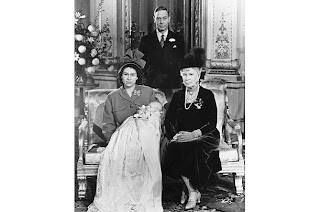“A majority of the British public believes Prince William would make a better king than the Prince of Wales,” announced The Sunday Times at the weekend. “Most people also think Prince Charles should stand aside for his son”.
 Charles' christening during the previous reign: with his mum, grandad and great-grandmama
Charles' christening during the previous reign: with his mum, grandad and great-grandmamaThis is a prime example of what the Irish call “the higher bollix”. Just think of all the questions begged here. What, for starters, is “a better king”? The monarch, after all, is a figurehead, nothing more. We don’t require a king who interferes in the business of state or who expresses opinions that might embarrass any (let alone all) of his subjects. All we want is someone who can read the government’s clunking prose at the State Opening of Parliament without a palpable tone of disdain, get through a garden party without asking someone in a motorised wheelchair if they’ve “come far”, and play host at a state banquet with the head of some god-forsaken state somewhere a long way away without keeling over into the crème brûlée or goosing any of the HOSGFSSALWA’s wives. These are all cogent reasons why neither Russell Brand nor Boris Johnson would be first choice for head of state in a republican UK.
 The heir to the throne with an unlikely rival as head of state
The heir to the throne with an unlikely rival as head of statePrince Charles is of course in many ways a dismaying testament to in-breeding and private education, but he has gamely survived as Prince of Wales – than which there is no more resonant “number two” designation in the history of the world – for more than half a century, having been handed his title a decade before his formal investiture at Caernarfon Castle in 1969. Princes of Wales have, from time immemorial, behaved as licensed fools and Charles has been accorded an inordinate amount of time in which to do this – on April 21st next year, he will have waited longer than any previous heir apparent, overtaking his great-great-grandfather who eventually became Edward VII.
HM Queen Elizabeth II is not going to abdicate, you can bet your boots, just to give her eldest son a good run at it. If she lives to 105, which seems perfectly feasible, she will have been the longest-reigning queen in the history of the world by more than fifteen years and her successor will be 82 or 83, a good age for a new career. It seems unlikely that Her Majesty will exceed the longest accredited male reign, however. That hard-to-beat record belongs to King Sobhuza II of Swaziland who retired to join his ancestors in 1982, having reigned since the last December of the previous century.
 The intended William Waleses
The intended William WalesesMore questions arising: Prince Charles has been a public figure for sixty years and, for good or ill, he has a fairly well-defined public profile. No doubt like anyone else in the public eye, his actual persona is very different in many crucial ways from the public perception. I do not know him personally, so I cannot say. (I stood in for his mother once, but that’s a matter for another day).
Charles has many firm views, not all of them completely batty, and he has had the temerity to express them. I should have thought that on balance his public expression of notions has probably done a bit more good than harm. I am also quite sure that he knows enough to know that, if and when he does ever become king, he will need to keep his views to himself thenceforward.
 Prince Charles wears Canadian aboriginal ceremonial robes (as you do)
Prince Charles wears Canadian aboriginal ceremonial robes (as you do) Prince William, on the contrary, is pretty much a closed book to most of us, I would suggest. Can you think of five adjectives to describe what you perceive to be his character? Neither can I. He seems a somewhat immature boy for 28, the age at which both Tim Buckley and Heath Ledger, who seemed rather older, died. His fiancée, who is a little his senior, might well have a beneficial influence on him. After all, he should still have time to grow into his role, which is doubtless to become our baldest king since the days when they wore wigs as a matter of course.
According to the Sunday Times survey, 44 percent of respondents agreed with the proposition that the Prince of Wales should “make way for William to become king when Elizabeth II dies”. Of course, this was what is known as a prompted response. What we cannot know from the report is the exact wording of the question that prompted the response. It seems to me that there are only two intelligent replies to such a notion: “no” or “it depends”. Does the survey distinguish between Prince Charles “making way” immediately after his mother’s death and his making it clear right now that he renounces his claim on the succession? Obviously not. In any case, his mother would never sanction the latter course.
 The Duke & Duchess of Cornwall – always in the market for Goonish gags about knees
The Duke & Duchess of Cornwall – always in the market for Goonish gags about kneesAnd did any of the respondents consider the constitutional mechanics of Prince Charles renouncing his claim? A number of those whom you might expect to find in the line of succession – or at least the first hundred in that line – are excluded from any claim by dint of joining the Roman church or by marrying Catholics. The most senior of these are the children of the Duke and Duchess of Kent, who would be respectively 28th, 29th and 30th in line but that they followed their mother into the Roman church and consequently carry out no royal duties – indeed Lord Nicholas Windsor, the youngest, was married in Vatican City, the first member of a British royal house ever to be so.
But for the heir to the throne himself to step aside would be unprecedented and would undoubtedly spark a controversy around the future of the House of Windsor quite as far-reaching as that of Edward VIII’s abdication. I expect the diligent market researchers carefully explained that when they asked their question.
 Wills with not Kate (actually Christina Aguilera)
Wills with not Kate (actually Christina Aguilera)The trouble is, of course, that most members of the public are what are known formally in the opinion-forming trade as “fuckwits” and their opinions on everything from Michael Gove’s policies for primary schools to the state of their own armpits are not worth having. Points West, the news magazine broadcast on BBC1 in the west country directly after the evening bulletins, ran various vox pop reactions on the day Prince William’s engagement to Miss Middleton was announced. “Oh yus” said a bloke in a cloth cap “I think it’s really good that they’ve got married”. It was probably just as well that they didn’t ask him something harder – like “what is your name?” – but why do such boneheads appear on the screen at all?
 Prince Harry early earned a playboy image
Prince Harry early earned a playboy imageReturning to the matter of the succession, Prince William currently ranks second after his father, followed by his brother Prince Henry (known to all as Harry). Third is probably the highest that Harry will ever reach, especially now that William is to marry. But if Prince William and the future Princess Catherine were to produce no children, Harry would be first in line once William became king. And his own children, if he produced any (legitimate ones), would lead the new line.
Now there is a persistent question over Prince Harry’s paternity. It arises because his physical resemblance to the Windsors is much less notable than is his brother’s and because his mother was thought to have taken lovers by the time of his conception. If Harry’s natural father were indeed one of Princess Diana’s men friends, a line wholly lacking a drop of blood royal would have leapfrogged to the top of the succession. This could be readily determined by a DNA test and perhaps such a test has already been applied. But consider the implications. It would all be very fine were such a test to confirm the paternity of Prince Charles. But what if it proved that Charles had no paternal link to Harry? Could Buckingham Palace contrive a credible scenario for severing Harry’s claim? Wouldn’t the real reason get disclosed or be widely guessed at? And what would Harry be told? And how would he react?
 James Hewitt and Prince Harry or perhaps vice versa
James Hewitt and Prince Harry or perhaps vice versaWould it not perhaps be better for all concerned to ignore the whole issue and let nature take its course? It probably would. But it would only need Harry’s Uncle Andrew, perhaps the most notorious royal philanderer since Edward VII, to notice that his own line would rise to the top if Harry were excluded. The Duke of York – whose title Prince Harry would be certain to take upon Andrew’s death – might well insist that Harry’s paternity be put beyond question.
Stranger things have happened. Who knows, perhaps the next monarch but two will turn out to be Queen Beatrice.



















